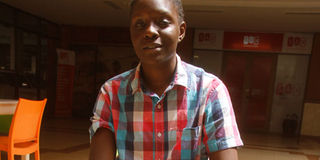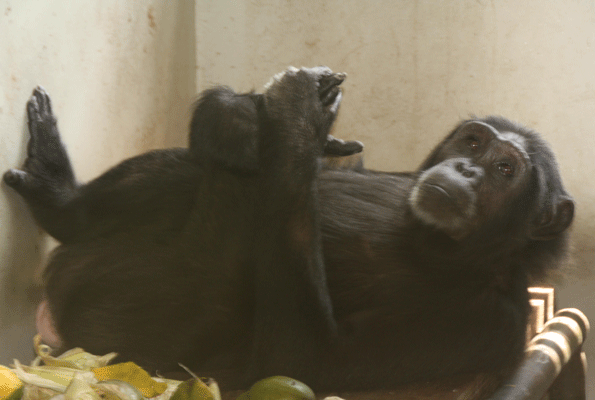I’m trapped in a woman’s body

Ninah Jordan Kwikiriza was born female but she has masculine traits which she is more comfortable with. PHOTO BY ABUBAKER LUBOWA
What you need to know:
- MYSTERY GIRL. Ninah Jordan Kwikiriza, 23, is a graduate of Childcare and Parenting.
- At 16, everything seemed unfavourable as her father threw her out of home because of her masculine physique and other traits.
- While her CV indicates that she is female, prospective employers think of her as an impersonator. GILLIAN NANTUME had a chat with her about her growing up.
Can you imagine the range of emotions that would go through you if your daughter intimated to you that she is actually a man? When I first got in touch with Ninah Jordan Kwikiriza, she asked if Sunday Monitor would pay for the interview. My answer was ‘no’ but, I gave her a compromise – sleep over it and call me. The next day, she was ready.
We agreed to meet at an ice-cream parlour at Oasis Mall. So, there I’m, 45 minutes early, sitting with my back to the basement, expecting a woman in drag to glide down the escalator. Then, a teenage boy – or what seems to be one – comes up behind me, from the basement, and stands over me. I feel, rather than see him.
Related content
“Are you Ninah?” Incredulity must be showing in my eyes. “Yeah,” she replies gruffly. She does not smile. Her short dreadlocks are shabby and she wears no makeup. I cannot help myself. My eyes are drawn to her flat chest. “Are you really a girl?” I ask. “What do you mean?” she replies. Her voice is deep. She later says it is much deeper in the morning. “If I spoke to you on phone at that time, you would think it is your father speaking.”
As we get talking
Meanwhile, the world is watching us. Two waitresses, after serving us, they stand in front of the counter and stare at Jordan while whispering. The manager joins them for a little tête-à-tête. Two cleaning women with blue buckets in hand passing by cut short their journey and stand staring at us. The security guards at the bank nearby cannot get enough of us.
These invasive stares have been part of Jordan’s (She does not like using her surname) life for so long that she does not acknowledge them anymore.
“No one understands me,” the 23-year-old says. “Some think I’m a girl, while others think I’m a boy. People stop me on the streets to ask about my gender. It is annoying. My friends cannot walk with me because people keep asking them what exactly I am. Where I live, people even bet about it.”
She is sitting away from the table, holding an ice-cream cone. The vanilla is melting in her hands, onto the floor.
Jordan lives in Seguku in her grandfather’s home, a refuge she found after her father kicked her out of his home when she was 16 years old. “When I was eight, I noticed I was different. I did not want to do girly things. Wearing dresses was a tag-of-war. At school, I was treated as a boy. Things were confusing; my father would call me an omen and the neighbours described me in harsher terms. Even my mother was confused. I was scared.”
Jordan’s maternal grandfather advised his daughter to take the child to schools that allow girls to dress like boys. “I do not know why my grandfather accepted me. Maybe he sympathised. I was a child who needed support. I know he loved me, but I do not know why. I keep asking myself why?” Her grandfather took on the responsibility of educating her. Jordan attended a succession of secondary schools. By that time, her voice had broken.
“I attended Kisubi something (St Mary’s College, Kisubi) for my Senior One. I was a day scholar. No one noticed I was a girl; not even the teachers. But, at some point, I realised fire (strife) coming, I left.”
Her next stop was St Joseph’s Senior Secondary School, Naggalama where she spent one term.
“That place was bad for me. They have open shower rooms. Everyone wanted to see what I was. So, I either waited for everyone to bathe or I woke up at 4am to bathe.”
Coping at school
She also attended Kings Way High School, Lincoln International School of Uganda, Taibah International School and Seroma Christian High School. In Seroma, Jordan thrived in the free atmosphere.
“I dressed like the male students. There were three students living with me in the cubicle – all girls. They were okay. They never had beef (a problem) with me. Maybe they had questions but feared to ask. I liked being with them.”
That did not stop other girls in the dormitory from teasing her. One day, when she entered the shower room they stole her clothes. She had to lock herself in till evening. “I felt so bad. I was lonely. There was no one to talk to. I tried talking to my friends but they told me, ‘Mwana, totuleetera biboozi byo.’ [Do not start your silly conversations]. I could not tell my mother. It seemed that the more I talked to her about my situation, the more I hurt her.”
Her grandfather, though, took her to another school. Jordan began her menstruation in her Senior Six vacation, and after the first months, her periods disappeared for months. “Nowadays, I do not even notice when I’m about to get them.”
The psychological impact
Besides her grandfather, Jordan’s mother has been her anchor. She has two children – Jordan is the only girl. Her father, a well-known personality in Kampala, has a number of children; most of them gave Jordan a hard time while growing up.
“My father disowned me because he never got to know the real me. When I was in Senior Two whenever I met his friends, they would tell him they have seen his ‘son’. He never knew which particular son, until I grew my hair. Then, they would tell him the son with long hair. One day, he said his child cannot be like me. He kicked me out.”
Jordan questioned why God made her the way she was. “I felt like committing suicide. I was losing it. I lost friends and people who were close to me. I did not understand myself. One day my voice was soft, the next day it broke. While girls giggled about boys, I was like, ‘bull***.’”
Seeking answers
With people telling her she had a problem, the confused girl visited pastors, doctors, and counsellors to find answers. “The counsellors told me to get a hold of my emotions and change. The pastors said I needed to turn away from Satan; some even chased me away. I could not bear to witness my mother’s pain, or see her hurt because of me, so I travelled to Nairobi. I just wanted to be far away. I lived alone, hustling.”
Her grandfather enrolled her at United States International University-Africa (USIU) for a course in Childcare and Parenting. “In Nairobi, I met people like me. They made me feel normal. I took up that course because I love children. I believe I will have children…there are many ways to get children.”
Her father tried to bridge the gap between them by forcing her to enroll for Biomedical Laboratory Technology, and even paid her tuition for a semester. “I did not like it, so I returned to my other course. I guess we began talking because my stepbrother had joined USIU.”
Jordan’s grandfather died in 2012 and for a moment, life retrogressed until her mother and brother stepped in.
Who is the real Ninah Jordan?
“I’m a man,” she says softly. “I just want to be me. People are born this way. It is not behaviour you adopt. I have seen girls like me live in hiding. I have small breasts but those girls have big breasts yet they feel they are men. It is even worse for boys who feel like they are girls inside.”
Walking the maze of unemployment
Jordan is among the rank-and-file of job hunters in Uganda.
“I’m looking for jobs in the line of childcare, probably in a children’s home. Unfortunately, my CV says I’m female but my appearance is male. Employers think I’m an impersonator.”
Public opinion is that people like Jordan are sponsored by Western gay organisations. She denies this. “If I were paid by whites, would I be here? I definitely would not be looking like this.”
Unconsciously, Jordan displays some girlish traits. As we leave the Mall, she takes selfies every few steps. Then, before we step out of the gate onto Access Road, she hands me the phone and tells me to snap some more.
EXPERT TAKE
“This is a hormonal condition. There are some babies who are identified as female yet their genitalia are ambiguous – external genitals do not appear to be either male or female. In such cases, baby girls appear to have a small penis in addition to the female organs; their external sex organs do no match their internal genetic sex. Secondly, women are born with oestrogen and low amount of testosterone. In some girls, though, the testosterone is higher. At puberty, they will manifest male characteristics.
It is best to visit an endocrinologist or gynaecologist for a proper diagnosis and treatment.” Dr Gilbert Ahimbisibwe, Senior medical officer, Women’s Hospital International and Fertility Centre
*Jordan’s mother did not want to be interviewed for this story






